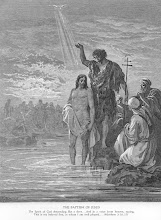After a long break from blogging (due to circumstances beyond my control) I am back online. The summer has been hectic to say the least - but so full of graces and grace-filled encounters with the Lord through the people I have ministered to (some of whom I accompanied into the next life with prayer and the Sacraments of the Church).
Then the Bishop called me in and told me that he wanted me to move to a new parish. And the past month or so I've been busy packing up and then unpacking my stuff. All that packing made me realise that I haven't really taken the Lord's admonition - 'Carry no purse or haversack' seriously enough. It's amazing how much 'stuff' one acumulates. I've been in the parish here now for just over two weeks and so far so good. I'm responsible for roughly 1000 souls here and it's a nice community with friendly 'natives'.
Of course I have begun what you might call 'liturgical renovations' by making small changes in the way things are done and trying to elevate the liturgy to a more solemn level - careful not to usher in a liturgical revolution all at once, though. Step by step - as they say.
I'm also teaching a few classes each week in a Secondary School (High School for those readers who are American/Canadian)and enjoy the challenge of the teens who ask what they consider intelligent and original questions! They pride themselves on being open-minded and free thinkers - and I'm amazed at how pre-conditioned they are and how much of their thought processes have been formed (deformed) by the media and popular culture. They don't actually think for themselves - they actually think what they have been conditioned to think. Their minds are, unfortunately neither open nor free.
Hopefully I will get more time now to make a few more entries in my blog. If you're a regular or have just happened upon this post - please say a prayer for me as I begin to shepherd a new flock in pastures new.
In the Hearts of Jesus and Mary,
Fr. B
Then the Bishop called me in and told me that he wanted me to move to a new parish. And the past month or so I've been busy packing up and then unpacking my stuff. All that packing made me realise that I haven't really taken the Lord's admonition - 'Carry no purse or haversack' seriously enough. It's amazing how much 'stuff' one acumulates. I've been in the parish here now for just over two weeks and so far so good. I'm responsible for roughly 1000 souls here and it's a nice community with friendly 'natives'.
Of course I have begun what you might call 'liturgical renovations' by making small changes in the way things are done and trying to elevate the liturgy to a more solemn level - careful not to usher in a liturgical revolution all at once, though. Step by step - as they say.
I'm also teaching a few classes each week in a Secondary School (High School for those readers who are American/Canadian)and enjoy the challenge of the teens who ask what they consider intelligent and original questions! They pride themselves on being open-minded and free thinkers - and I'm amazed at how pre-conditioned they are and how much of their thought processes have been formed (deformed) by the media and popular culture. They don't actually think for themselves - they actually think what they have been conditioned to think. Their minds are, unfortunately neither open nor free.
Hopefully I will get more time now to make a few more entries in my blog. If you're a regular or have just happened upon this post - please say a prayer for me as I begin to shepherd a new flock in pastures new.
In the Hearts of Jesus and Mary,
Fr. B

